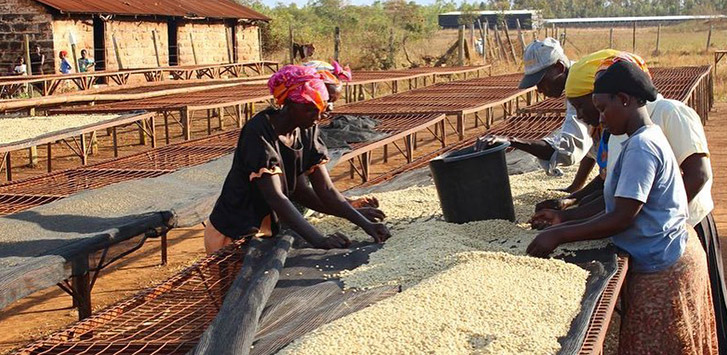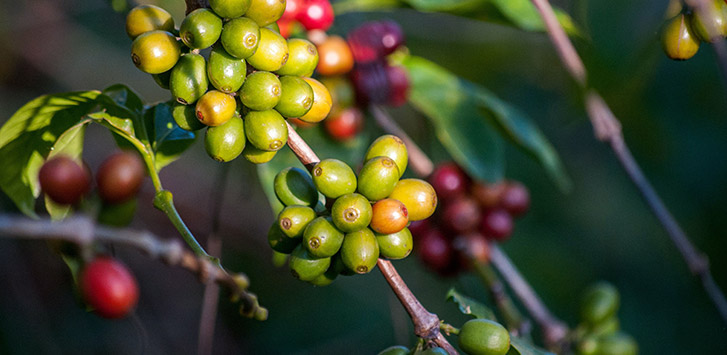
Across the world, women work hard outside, creating the backbone of all agricultural production. Despite making up almost half of the world’s agricultural workforce, women often are underrepresented and undervalued. So to honor the women in the coffee industry, we rounded up a list of all our woman-owned, women-empowering coffees for you.
We hope you enjoy the unique flavors and quality coffee that these women bring to the industry!
The Role of Women in the Coffee Industry
First, let's talk about the role of women on a coffee farm. Historically, we haven’t known much about women’s involvement in coffee.
The first research study on women on coffee farms was completed by the International Coffee Organization in 2008. From this report, we know that women represented about 70% of the workforce at this time. But their jobs mainly consisted of manual labor—from planters to harvesters to sorters.
The International Women's Coffee Alliance (IWCA) was founded to further the research on women in the coffee industry. Since its founding, the IWCA has poured years into researching this area, answering questions, like:
- How many women work in the coffee industry?
- What are women's roles in the coffee industry?
- Does gender equality in each country affect women's roles in the coffee industry?
This research is used to promote greater gender equality and sustainability practices worldwide.
A Lack of Resources and Support
Centuries of gender equality issues play into women's roles in the coffee industry. Most coffee is grown in developing countries where coffee is a male-dominated industry. Because of this, women tend to face a lack of resources, education, and support from their counterparts. This means, when it comes to growing coffee, they have less access to the necessary resources to improve crop yield and quality.
Coffee Cooperatives That Support Women
As we move into the future, women, worldwide, are standing together to change the industry. In the Democratic Republic of the Congo, Women for Women International works to uphold the country’s constitution, fighting for women's influence in the business world.
In Costa Rica, the ASOMOBI cooperative operates the first Costa Rican women-run micro-mill.
In Rwanda, the Abakundakawa cooperative has grown from 180 to 2,000 coffee farms since its founding in 2004. From this cooperative, two women’s associations were founded, Duhingekawa and Abanyameraka. Both associations support women in trades outside of the coffee industry.
Other companies that support women in coffee are:
- Fairtrade
- Women in Coffee Project
- Sustainable Harvest
- Equal Exchange

Ten Green Coffee Beans Grown by Farms Empowering Women
Here’s the part you’ve been waiting for: A list of green coffee beans grown by women, at Coffee Bean Corral. Feel free to try every coffee on this list and let us know your thoughts!
Grown by the Hingakawa Women’s Association, part of the Abakundakawa cooperative, these green coffee beans boast tropical notes of pineapple, lemon verbena, grapefruit, and various berries. A honey sweetness coupled with a creamy body and winey acidity finish off this incredible cup of coffee. But their coffee isn’t the only amazing thing that’s happening. You can read more about their efforts to empower women in the coffee’s description.
Finca Santa Margarita is a family-owned coffee farm run by Camila Topke. The farm supports women and families by:
- Employing mostly women
- Running a grafting program
- Founding an on-site school and church
- Providing on-site medical care to all employees
Besides all this, Finca Santa Margarita also makes great coffee. Characterized by notes of milk chocolate, citrus, caramel, brown sugar, and honey, this coffee is perfect as a pour over or cold brew on a warm summer day.
Even the name of this coffee gives credit to the women of the family. Hailing from Sumatra but grown in Costa Rica, these green coffee beans are named for the maternal figure in the family "Boru".
The Sumatra Boru Batak boasts a heavy body balanced by unique notes of cedar, leather, and butterscotch. A light spicy taste undercuts the entire cup, and a delightful buttery mouthfeel finishes it off.
These green coffee beans are grown by farmers in the Oaxaca State Coffee Producers Network (CEPC). Funds from the CEPC are used to:
- Promote women’s organizations
- Support families
- Finance the coffee industry to prevent further instability
The Organic CEPCO Oaxaca creates a clean cup of coffee you’re sure to love. Sweet citrus notes are well-balanced by rich, brown sugar and cocoa. A buttery mouthfeel provides the perfect finish to this Organic-Certified, Fair Trade-Certified coffee.
5. DR of Congo Organic Mapendo
The Organic Mapendo is grown on a women-owned coffee farm. Fikiri Charlotte, the owner, named the beans "mapendo," meaning "love." And she pours a lot of love into her 16 lot farm with over 4,000 farmers. Running her own coffee farm has been a blessing for Charlotte, providing the funds to purchase a goat, a house, and additional land for the farm.
The Organic Mapendo has notes of strawberries, red apple, and honey. A bright, winey acidity, buttery mouthfeel, and rich sweetness put the finishing touches on this complex cup of coffee.
18 Rabbit
The final five coffees on this list are all grown by the same farm—18 Rabbit—in Honduras. Female-owned and run by Flhor and her family, 18 Rabbit produces high quality, organic coffee, often scoring about an 87 for their coffee.
Made up of 13 farms separated into micro lots, 18 Rabbit puts sustainability first with
- 300% higher wages than the Fair Trade standard
- Organic and biodynamic farming practices
18 Rabbit uses 18 Rabbit Exports for their green coffee beans. 18 Rabbits Exports is another woman-owned business, run by Dulce Marlen, owner of Finca Dulce Luna and matriarch of the family.
The Organic 18 Rabbit Yellow green coffee beans have mild floral notes, reminiscent of honeysuckle, with a creamy body, mild acidity, and well-balanced flavors. Hints of chocolate underly the cup.
A bold aroma with notes of strawberry, raspberry, and cherry characterize the Organic 18 Rabbit Red coffee. The mild fruity notes are well-balanced by other notes of graham crackers and walnuts. A heavy body, balanced acidity, mild sweetness, and smooth mouthfeel finish off this well-rounded coffee.
Diverging from othre 18 Rabbit coffees, the Organic 18 Rabbit Black coffee has a tea-like flavor profile. With notes of black tea and floral, a pervasive honey sweetness, and a lemongrass acidity, this coffee brews a thin, clean cup.
The only 18 Rabbit coffee to undergo dry processing, the Organic 18 Rabbit Natural has a delightful strawberry aroma. The fruit-forward coffee is balanced out by subtle hints of chocolate. The thin body, buttery mouthfeel, and winey acidity create a more refreshing, light cup of coffee than other 18 Rabbit coffees.
The Organic 18 Rabbit Washed greets you with a rich aroma of chocolate and caramel. The chocolate notes carry into the flavor of the coffee and are balanced by a mild green apple-like acidity. A heavy body and light fruity and floral notes finish this delicious cup of coffee.